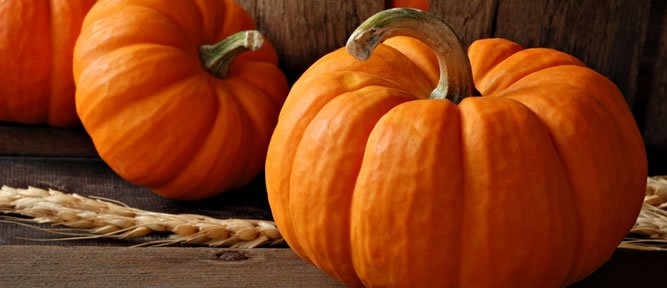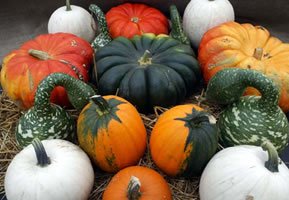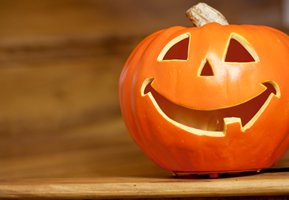A.Vogel search
When the internal search is activated, personal data such as your IP address is transmitted to our search engine Cludo. Data is thus transferred to a third country. Please click here if you want to display the internal search. You can find more information on data protection here: Privacy policy.
Pumpkin
Discover all about pumpkin, including fun facts, varieties, nutritional information, the health benefits of pumpkin and tasty recipes.
The king of the vegetable patch, the mighty yet humble pumpkin is much more than a Halloween decoration. Super nutritious, naturally sweet and very low calorie, pumpkins aren’t just good for carving, they’re rich in health benefits too! They are a colourful and versatile ingredient in many tasty and healthy recipes including soups, salads, pies, curries and cakes. The flesh, seeds and blossom can all be eaten and enjoyed and are all a fantastic source of vital nutrients.

When you think of pumpkins you naturally think of them in a vegetable patch, but did you know a pumpkin isn’t actually a vegetable; it’s technically a fruit! Part of the Cucurbitaceous family (which also includes cucumbers, squash and melons) pumpkins generally begin to ripen in early September, with pumpkin season beginning in end of September and ending in October. Once harvested, they can keep for months if stored properly, some varieties for up to a year.
Varieties of pumpkin
 Although the more widely known and used variety of pumpkin is bright orange, there are also yellow, red, white and even blue, green and grey varieties.
Although the more widely known and used variety of pumpkin is bright orange, there are also yellow, red, white and even blue, green and grey varieties.
Pumpkins vary greatly not only in colour but also in size and shape and most varieties sound like fairytale characters such as ‘Jack Be Little’, ‘Baby Bear’ and ‘Wee Boo’; - all miniature pumpkins that can fit into the palm of your hand and are ideal for decoration. ‘Harvest Jack’ and ‘Connecticut Field’ average 25lbs in weight and are easy to grow, harvest and carve - they make ideal Halloween lanterns, thanks to their size, shape and long handles. “Blue Doll”, as the name suggests, is an eye-catching blue pumpkin and the French ‘Cinderella’ is bright orange, flat and ribbed. ‘Dill’s Atlantic Giant’ weighs in at a whopping 200lbs and is ideal for seeds. The unique ‘Peanut’ pumpkin is pink in colour and covered in beige spots and white varieties include the spooky-sounding ‘Casper’, ‘Moonshine’ and ‘Baby Boo’, a miniature white. ‘Red Warty Thing’ is our fairytale villain, an eerie red pumpkin covered in lumps, but he has a sweet heart as actually has with delicious syrupy-tasting flesh. Other good pumpkins for eating include ‘Cinderella’, ‘Baby bear’ and ‘Fairytale’ which are all great for roasting, soups and stews due to their rich flavour.
If you’re planning to bake with your pumpkin, go for the smaller varieties (around 4lbs) including ‘New England Pie’, ‘Jarrahdale’ and ‘Small sugar pumpkin’, the sweetest pumpkins in the patch. And if it’s the highly nutritious seeds you’re after, you can use any variety.
Nutritional information
Pumpkins are an extremely nutrient-dense food packed with vital vitamins and antioxidants including vitamin C, lutein and B vitamins. Just one portion contains over 100% of your RDA of vitamin A, whilst 100g of the seeds deliver 110% of your RDA of iron. They are rich in fibre and protein as well as a host of minerals essential for the effective functioning of the body, including magnesium, calcium and potassium.
![]()
Health benefits
 Pumpkins are one of the richest sources of beta-carotene, believed to reduce the risk of developing heart disease and certain types of cancer (prostate, lung and oral).
Pumpkins are one of the richest sources of beta-carotene, believed to reduce the risk of developing heart disease and certain types of cancer (prostate, lung and oral).
The powerful combination of nutrients found in just a small portion of pumpkin can reduce blood pressure, cholesterol and the risk of stroke, whilst boosting fertility and the immune system and improve skin, brain and eye health.
And it’s not only the flesh of the pumpkin that’s packed with health-boosting benefits; Pumpkin seed oil, with its robust and distinctive flavour, is rich in essential fatty acids known for preventing cardiovascular disease, depression, asthma rheumatoid arthritis and symptoms of the menopause.
Roasted pumpkin seeds make a delicious snack with just 100g containing 110% of your RDA of iron and an abundance of mono-unsaturated fatty acids, which are great for heart health.
Having trouble sleeping? Then reach for a handful of pumpkin seeds a few hours before bed. They are an excellent source of tryptophan, which the body converts into melatonin, the ‘sleep hormone’.
Pumpkin recipes
A.Vogel Blog – Natural and Healthy
Inspiration for a healthy life!



